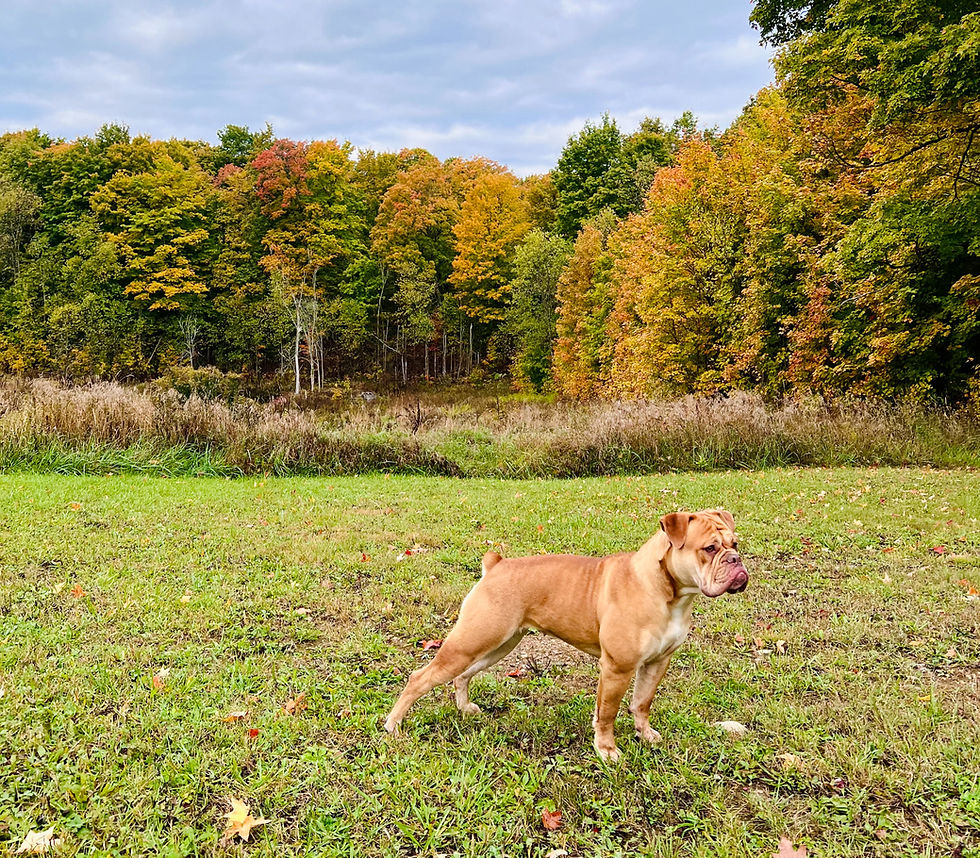Discover the healthier bulldog choice : English Bulldog vs Olde English Bulldogges
- Sarah Wiggins
- Aug 13, 2025
- 4 min read
Choosing the right bulldog breed can be a tough decision for dog lovers. Many people often find themselves comparing the classic English Bulldog with the relatively rare Olde English Bulldogge. Both breeds bring joy and companionship but also come with different health considerations. This post will dive into the similarities and differences between the two breeds, focusing on their health traits. You'll see why the Olde English Bulldogge might be the healthier option, making it a great choice for dog enthusiasts.
A Brief History of the Breeds
The English Bulldog has a rich history, dating back to the 13th century. Originally bred for bull-baiting, this breed has become a beloved companion known for its loose skin and pushed-in nose. Sadly, its popularity has also meant that many English Bulldogs suffer from significant health issues, primarily due to their brachycephalic (short-nosed) structure. Studies show that over 80% of English Bulldogs experience some form of health issue related to their breathing and mobility.
In contrast, the Olde English Bulldogge is a more recent breed, established in the 1970s by breeders looking to revive the original bulldog type. It offers the same muscular build as its ancestors while avoiding many of the health problems that plague the English Bulldog. Just 10% of Olde English Bulldogges face similar health problems, marking a substantial improvement for potential pet owners.
Health Considerations
English Bulldog Health Issues
The English Bulldog is well-known for various health concerns, many caused by its unique physical characteristics. Common issues include:
Brachycephalic Airway Syndrome: With their short snouts, English Bulldogs often struggle to breathe, especially in hot weather or when they are active. This can drastically limit their enjoyment during outdoor activities.
Hip Dysplasia: A common genetic condition affecting approximately 20% of English Bulldogs, this condition can result in arthritis and mobility challenges.
Skin Conditions: The loose skin of the English Bulldog can trap moisture, resulting in infections, especially in the folds. It's estimated that nearly 30% of English Bulldogs suffer from skin infections.
Obesity: Approximately 40% of English Bulldogs are overweight, which exacerbates existing health issues and shortens their lifespan.
These health concerns can lead to higher veterinary costs and a reduced quality of life, steering some dog lovers away from English Bulldogs.
Olde English Bulldogge Health Benefits
Conversely, the Olde English Bulldogge has been bred with a focus on health. Here are some notable benefits:
Improved Breathing: Thanks to their longer snouts and less pronounced brachycephalic features, Olde English Bulldogges generally have fewer breathing problems. This allows them to maintain a more active lifestyle, reducing the risk of obesity-related issues.
Reduced Genetic Disorders: By avoiding the genetic problems seen in English Bulldogs, such as hip dysplasia and skin issues, Olde English Bulldogges enjoy a healthier existence. This breed flips the script, with only 5% experiencing serious health problems.
Athletic Build: Generally, Olde English Bulldogges present a more athletic and agile physique. This contributes to a longer lifespan, with studies showing they can live up to two years longer than English Bulldogs, averaging around 12-14 years.
Lower Obesity Risk: With their higher energy levels, Olde English Bulldogges are less likely to gain weight, further lowering their risk of health issues related to obesity.

Temperament and Lifestyle
English Bulldog Temperament
English Bulldogs are known for their calm and gentle nature. They make excellent companions for families looking for a laid-back pet. However, their low energy levels and health issues often limit their ability to engage in physical activities. This breed is best suited for those who enjoy a quieter lifestyle.
Olde English Bulldogge Temperament
In contrast, the Olde English Bulldogge is often more energetic and playful. With a loyal and protective nature, they excel as family pets. Their athletic build and higher energy levels allow them to participate in various activities, from walks to playtime in the park. This not only benefits the dog but also encourages a more active lifestyle for owners.
Choosing the Right Breed for You
Deciding between the English Bulldog and the Olde English Bulldogge involves considering your lifestyle and what you're looking for in a pet. If you seek a low-energy companion that enjoys relaxing around the house, the English Bulldog could suit you well. However, if you want a healthier bulldog that can accompany you on outdoor adventures and maintain an active lifestyle, the Olde English Bulldogge is likely the better fit.
The Rarity of the Olde English Bulldogge
One of the most appealing features of the Olde English Bulldogge is its rarity. Being a breed established in the 1970s, finding one can be a unique and rewarding experience. This rarity often leads to forming bonds within a community of passionate breeders and fans dedicated to preserving the breed's health and unique traits.

Wrapping Up
In conclusion, while both the English Bulldog and the Olde English Bulldogge have their unique qualities, the Olde English Bulldogge stands out as a healthier choice. With fewer health issues, a more athletic build, and an energetic temperament that allows for an active lifestyle, this breed is an excellent option for those seeking a loyal companion.
If you're thinking of adding a bulldog to your family, take the time to research and meet both breeds. You might discover that the Olde English Bulldogge not only meets but exceeds your expectations, offering a healthier and more fulfilling companionship.
We breed quality, health tested Olde English Bulldogges with a fucus on temperament, check out our puppies section to see what pups we have available or to join our waitlist!





Comments